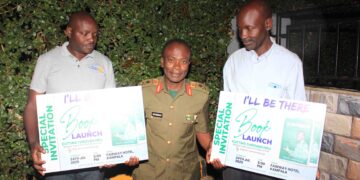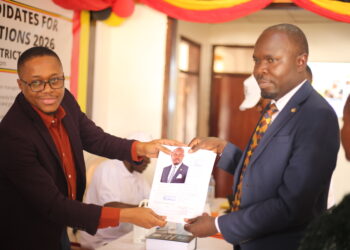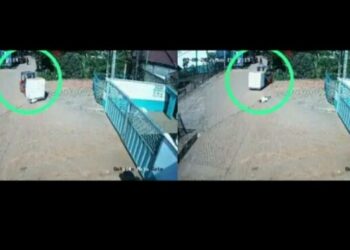Around nightfall at Kasensero landing site in Kyotera district, Southern Uganda, a group of 20 local fishermen head out for fishing on Lake Victoria. Their family members are praying for their safe return since each trip is a potential death trap due to the increasing theft of outboard engines.
25-year-old Margret Nalunkuuma, knows the threat so well. Her husband, Joseph Kiggundu, left the same way last November but never returned home.
His body was found three days later, floating in the lake and his 15HP-Yamaha water engine was gone. “It is because of an engine that my husband was killed,” she recounts.

Kiggundu is one of the four fishermen brutally murdered for their engines in just 11 months, and more than 40 killed in similar circumstances over the past decade at Kasensero.
From Kyotera, across the island districts of Buvuma and Kalangala (Ssese Islands), more than 100 fishermen have been killed and over 500 engines worth sh3.5 billion looted by suspected pirates in the past decade.

Organised Criminal Networks
It has been established that a strategic and organised criminal network prowls busy landing sites targeting boats returning from deeper waters. This is attributed to weak cross-border enforcement and unpatrolled porous borders on the lake.
One intelligence officer in Kyotera, who requested anonymity, disclosed that there is a sophisticated black market for stolen engines that the police and other security agencies have not busted due to its complex operations.
“These engines don’t simply disappear as fishermen think. Some people out there are making bloody money from the stolen engines,” he says. He adds that they conducted inquiries to establish who was behind the killing of fishermen and theft of engines.

However, disturbing leads indicated that stolen engines go through a chain of handlers before they reach the dealers or buyers.
According to the lead, he adds, the engines first reach underground workshops or chop shops in Tanzania and somewhere in Uganda, where serial numbers are erased.
It is then repainted and resold at a cheaper price, while others dismantle them into spare parts before being smuggled or sell them to dealers across East Africa.
This account was recently reinforced by a survivor James Kafeero, who escaped twice but lost two engines to suspected pirates. According to Kafeero, some fishermen have become collaborators who secretly provide information to criminals who target fellow fishermen in the deeper waters of the lake.
“You either surrender the engine, your phone, and other belongings to stay alive or you resist and lose both life and property,” recalls, adding that despite the risk, many fishermen continue returning to the lake to support their families, pay loans and sustain their livelihoods.

Survivors report that the engine thieves usually travel on speed boats operating in groups of threes or fours, armed with pangas and spears and guns on rare occasions. They add that the attackers use reinforced boats to crash into their victims’ boats.
They add that these attacks happen at night in the deeper waters, mostly around Nabisekulo, Kabindi, Masanga, Male, and Gabiro where there is no serious enforcement.
The 2024 Police Crime Report indicates 33 boat outboard engines were stolen on Lake Victoria. The crimes are further propelled by cross-border oversight gaps, lack of engine tracking systems, engine identification protocols and Global Positioning System (GPS)-marked boundaries.

Enforcement, Legal Gaps
Emmanuel Sseremba, who heads Kasensero fishermen, argues that unreliable enforcement opens windows for crimes to thrive. He says arrested suspects are often released by police due to a lack of enough evidence, especially when the stolen engines are sunk in the lake to bury evidence.
“Last year, we arrested four suspected ‘pirates’ from Tanzania. They sank the engine to destroy proof,” he recounts, adding that they were taken to Kyotera police station, but released for lack of evidence.
Sseremba explains that their boat was impounded and kept at Kasensero, having been spotted in a number of deadly raids on the lake.

Impact on Livelihoods, the economy
According to John Kayumba, the Chairman for Kasensero Landing site and head of the Boat Owners Association (BOA), over 350 engines have been stolen over the past decade, including 16 engines worth sh144 million that he personally lost.
In 2018, the landing site had more than 500 operational boats and engines. Today, only 180 remain active. Still, BOA, which had 60 boats and engines, currently has 36 engines left.
According to Kayumba, the population of fishemen has also dropped from over 1,000 fishermen to 400 due to the increasing insecurity and lack of coordinated oversight.

“When criminals steal engines and cross into Tanzania or Kenya, local police cannot pursue them beyond Ugandan borders, hindering investigations and prosecution,” he adds, saying this has greatly affected the livelihoods of so many communities.
Joseph Kimera, the Councillor for Kasensero Town Council, says engine theft has left many companies and investors making huge losses. He points out Besiga Mukama company, which previously operated 15 boats, but now has only 9 remaining after losing their engines, while Mpende, which had 15 boats, currently has none.
“The fishermen who used to work for these companies are now jobless and their families are suffering while some have already left the landing site for other business,” he explains.
As a result, the deceased’s families are struggling with widows currently trapped in poverty and piling debt. Kimera further estimates that more than 100 children of school-going age have dropped out of school since their fathers’ death and disappearance, yet there isn’t any Universal Primary Education school in the town council.

Fisheries Department
According to the District Fisheries officer – Jonan Rusoke, the department doesn’t have a fisheries patrol boat, adequate fuel, and life-saving equipment such as life jackets, binoculars, which mostly limit quick response to various incidents of piracy or engine safety emergencies on the lake.
“These challenges often hamper surveillance and enforcement on the lake,” he adds.
A September 13, 2025, report for a cross-border meeting held at Mutukula, a Uganda-Tanzania border post, further recommends several measures aimed at clamping down on crimes and protecting fishermen. The measures include demarcation of an imaginary border line in the waters of Lake Victoria using floaters.
Other recommendations include the harmonisation of fisheries laws and regulations of both countries, in addition to putting tracking devices in the Engines for both countries, to ease police work in their investigation.
“Having a joint surveillance operation on the lake to fight illegal activities can have a great impact,” the report suggests.

Loans and Debt
Every stolen engine plunges fishermen into huge debt. A 40HP-Yamaha engine (2-stroke) costs around sh15 million and above. This money is largely borrowed from local Savings and Credit Cooperative Organisations (SACCOs) or banks, while others are borrowed from quick loan agents.
Amid this dilemma, even SACCOs and banks are hesitant to give out loans to fishermen, especially in the most affected landing sites. A manager of one of the SACCOs in Kyotera, reveals that loan defaults have reached millions since 2023, as many fishermen disappeared after losing their engines.

Kalangala District
In Kalangala (Ssese Island), 20 engines were stolen last year from Mazinga Island near Tanzania, and Bubeke and Nkese near Kenya, while two fishermen have been missing since December 20. Previously, Nkose alone lost over 40 engines in 2022.
In February this year, two suspected pirates, both Tanzanian Nationals, were arrested at Nkose-Katooke landing site in Mazinga sub-county following the deaths of two Tanzanian fishermen – Dadi and Zaakayo, both residents of Butujja landing site in Mwanza.
Adrian Kavuma, the Kalangala Fisheries officer, explains that piracy accounts for only 5 to10% of the challenges facing the fisheries sector. “Illegal fishing remains the major concern, despite a few cases of engine theft,” he says.
Kavuma adds that some crimes (engine theft) are masterminded by foreigners and others by fellow Ugandans, attributing it to the limited manpower and marine police resources.
Recently, criminals have changed tactics, whereby they steal engines for ransom. “They ask for around sh4 million to return the engines they have taken,” he states.

Kalangala police report one or two cases every quarter, according to Kenneth Massette, the Kalangala District Police Commander. Massette adds that Kalangala’s shared boundaries with other countries and districts make it difficult to patrol all porous routes due to scanty resources.
He further dismissed allegations that the marine police collaborate with criminals who terrorise fishermen. “That’s not true. They make claims but often fail to report these particular cases promptly for quick response,” he says.
In some cases, Ugandans are directly involved in aggravated robberies on the lake. “We arrested a man identified as Gerald Katongole, who was involved in the theft of two engines,” he recounts.
To curb crimes committed on the lake, he revealed, they plan to install surveillance or tracking systems along the Ugandan boundaries with the help of the National Enterprise Corporation (NEC). The systems will be installed in Lutoboka, Nkese and Mazinga islands, which are major hotspots for criminal operations.
He adds that they are intensifying community engagements and policing in collaboration with the Resident District Commissioners, FPU, in addition to arresting, investigating and prosecuting criminals,” he explains.
These initiatives follow President Yoweri Museveni’s announcement in August 2025, to introduce radar-based surveillance systems on major lakes in the country to monitor and crack down on illegal fishing and other crimes on the lake, including piracy.
The president was meeting leaders of fishing communities in Jinja City, where he said that advanced radar systems were already active on Lake Albert (Mwitanzige).

In Buvuma district, which shares borders with Kenya, piracy is orchestrated by organised groups. According to Robert Migadde, the Member of Parliament for Buvuma Island County, over 40 outboard engines were stolen as of December 2024.
In January this year, police arrested a group of six people accused of masterminding attacks on fishermen. Buvuma Assistant RDC – Moses Kizito Buule, explains that they conduct regular operations on the lake to avert engine raids.
Police intelligence also indicates that, due to shrinking fish stocks, disputes among fishermen over strategic fishing zones sometimes escalate into unexplained deaths and disappearances, which are then portrayed as acts of piracy, although not all fishermen who die lose an engine.

Fisheries Protection Unit
Lt. Lauben Ndifula, the spokesperson for Uganda Fisheries Protection Unit (FPU), says they immediately notify counterparts in Kenya, Tanzania and D.R Congo when theft occurs. They also hold joint meetings, but local leaders rarely participate.
Apart from pirates, Ndifula says, sometimes engines are lost when authorities in neighbouring countries confiscate them. “Without proper documentation to show proof of ownership often complicates the recovery of lost engines and thorough prosecution,” he explains.
According to Ndifula, engine thieves from Uganda can steal from Kenya, and Tanzania and operate within the borderlines of the lake, wielding machetes and other weapons. “But for the case of D.R.C, armed militia groups are directly involved in robbing Ugandan fishermen,” he says, adding that the FPU and Marine soldiers respond promptly if they are alerted in time.

AFALU, MAAIF
The Association of Fishers and Lake Users of Uganda (AFALU) highlights that piracy on Ugandan lakes is worsened by weak law enforcement and corruption.
“There have been cases of complicity of some rogue security officers in marine police being reported by fishermen and several have been identified and punished,” says Godfrey Ssenyonga Kambugu, the AFALU Chairman.
However, some incidents often end up fatal because the perpetrators are usually known to the fishermen,” he explains.

RWG Project, EA Interventions
During the 5th Regional Working Group (RWG) meeting in Kampala held in July this year, Gen. David Muhoozi, the state minister for Internal Affairs, appealed for enhanced regional cooperation among Uganda, Kenya, and Tanzania to combat transnational crime on Lake Victoria.
According to Muhoozi, it’s not easy to tackle cross-border crimes single-handedly, adding that strength lies in partnerships, regular cross-border meetings, capacity building, intelligence information sharing, in addition to harmonisation of legal frameworks.
A Tanzanian fisheries official, who attended last year’s four cross-border meetings at Mutukula border post and Kabindi landing site in Tanzania, reported that the absence of joint policing and constant intelligence sharing hampers the fight against piracy.
However, experts say that until the leaders at the district, national and regional levels intervene to protect fishermen, Lake Victoria will continue swallowing engines and innocent lives.
District Fisheries Department
The District Fisheries department faces significant challenges in coordinating with the marine police due to the lack of essential logistics to support its operations.
This story was produced with support from the African Centre for Media Excellence (ACME) under the Media Support for Public Accountability and Civic Engagement (M-SPACE) Initiative.
































